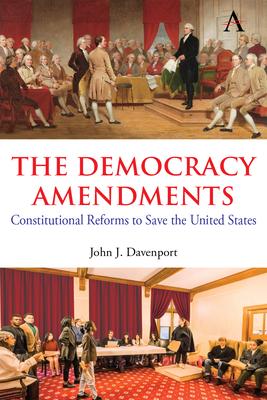- Americans perceive the many political dilemmas in our society and corruption in our government, but few understand the causes of these problems. After explaining the constitutional roots of declining governing capacity in our federal system, this book sets out a comprehensive agenda of 25 amendments that can attract wide support across the political spectrum. The "top 10" proposals include reforms to make elections more competitive, reliable, and fair, such as ranked choice voting ("instant runoffs"); semi-open primary races with fixed dates rotating among all states; an anti-gerrymandering formula to make congressional elections more competitive; improved access to the polls through a national voter registry and voter rights; limits to campaign donations and political advertising. Instead of considering them piecemeal, we should understand how the needed amendments form a systemic overhaul that includes major improvements to the House and Senate. This requires a ban on filibusters, creative ways to fix unequal representation in the House of Representatives, and restoring popular access to legislators. Improving the judiciary requires an 18-year term on the Supreme Court and appellate courts, firm deadlines for confirmation votes to reduce partisan pressures on the judiciary, and clarification of judicial review. A national civics education curriculum and fair-and-balanced requirements for mass media would make it much harder to manipulate people through misinformation campaigns. The book also argues for direct election of the president, Puerto Rico statehood, and ways to fix our current radical inequalities of voter influence in the Senate. Several common-sense "good government" reforms will reduce corruption. These include mandated financial disclosures; a requirement for federal legislators and officers to hold their assets in blind trusts; penalties for campaigns using stolen information; limits to the president's pardoning powers; and clearer grounds for impeachment. Beyond the filibuster, there are further steps to break gridlock in Congress and fix the budget process. Finally, we need to improve the amendment process itself, and clarify how a national convention should work as an alternative to Congress for proposing amendments for ratification. When called by 38 states, a convention can reach national compromise on a whole package of amendments to restore responsive, efficient, and effective government.

Book
The Democracy Amendments: Constitutional Reforms to Save the United States
(Write a Review)
$116.11
- Americans perceive the many political dilemmas in our society and corruption in our government, but few understand the causes of these problems. After explaining the constitutional roots of declining governing capacity in our federal system, this book sets out a comprehensive agenda of 25 amendments that can attract wide support across the political spectrum. The "top 10" proposals include reforms to make elections more competitive, reliable, and fair, such as ranked choice voting ("instant runoffs"); semi-open primary races with fixed dates rotating among all states; an anti-gerrymandering formula to make congressional elections more competitive; improved access to the polls through a national voter registry and voter rights; limits to campaign donations and political advertising. Instead of considering them piecemeal, we should understand how the needed amendments form a systemic overhaul that includes major improvements to the House and Senate. This requires a ban on filibusters, creative ways to fix unequal representation in the House of Representatives, and restoring popular access to legislators. Improving the judiciary requires an 18-year term on the Supreme Court and appellate courts, firm deadlines for confirmation votes to reduce partisan pressures on the judiciary, and clarification of judicial review. A national civics education curriculum and fair-and-balanced requirements for mass media would make it much harder to manipulate people through misinformation campaigns. The book also argues for direct election of the president, Puerto Rico statehood, and ways to fix our current radical inequalities of voter influence in the Senate. Several common-sense "good government" reforms will reduce corruption. These include mandated financial disclosures; a requirement for federal legislators and officers to hold their assets in blind trusts; penalties for campaigns using stolen information; limits to the president's pardoning powers; and clearer grounds for impeachment. Beyond the filibuster, there are further steps to break gridlock in Congress and fix the budget process. Finally, we need to improve the amendment process itself, and clarify how a national convention should work as an alternative to Congress for proposing amendments for ratification. When called by 38 states, a convention can reach national compromise on a whole package of amendments to restore responsive, efficient, and effective government.
Hardcover
$116.11